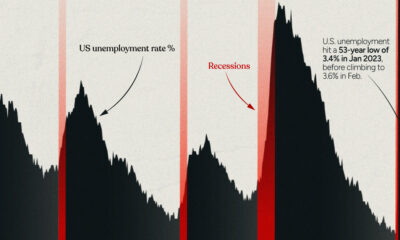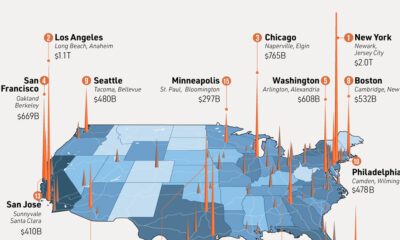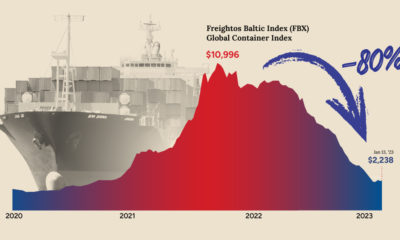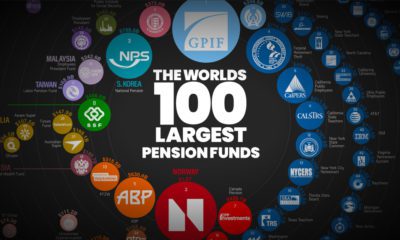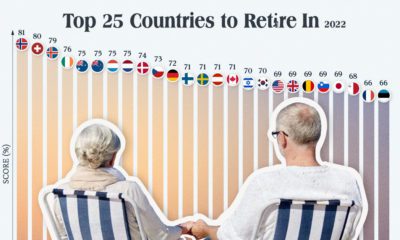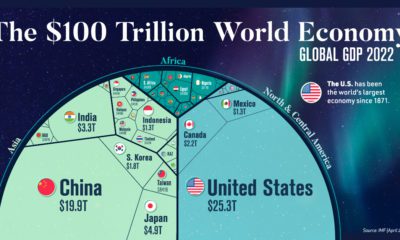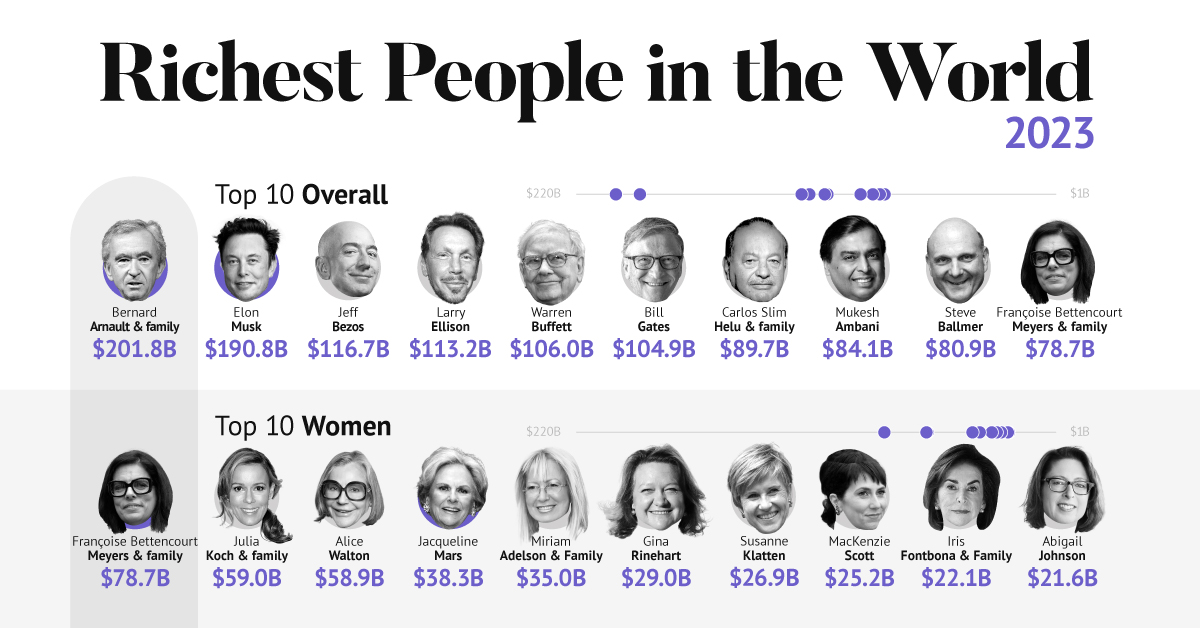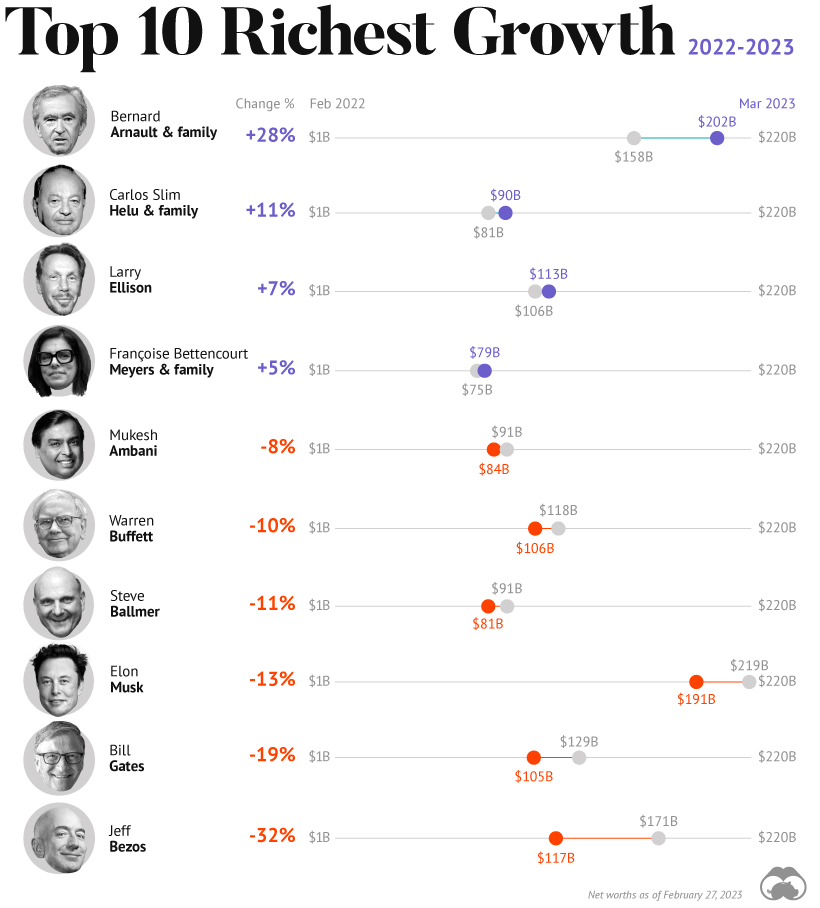Many view retirement as a welcome reward following a successful career. The transition, however, is not always easy. An enjoyable retirement is often dictated by the amount of money people have set aside. Today’s infographic from Raconteur visualizes attitudes towards retirement around the world, comparing expectations and actualities for retirement income. Does reality meet their expectations?
Income Expectations Vary by Country
A global survey by asset manager Schroders—looking at 22,000 investors from 30 countries—highlights that retirement income often falls short of expectations. Here’s what non-retirees (55+ in age) expect to make in retirement as a percentage of their salary, compared to the actual incomes generated by retirees: *Denotes countries with small sample sizes. Not having enough money at retirement is a nearly universal issue, and 51% of employees with a workplace pension are worried that they won’t make enough to live their ideal retirement life. Of course, there are always notable exceptions to every rule. In India, for example, the reality of retirement is often better than anticipated. Non-retirees expect that 71% of their annual salary will provide what is needed to live comfortably in retirement, but in practice they get 96% of their salary in retirement—far higher than they thought.
Most Important Aspirations
The world is divided when it comes to working into retirement. The majority of people want to spend their retirement doing non-work related activities:
Traveling: 60% Spending more time with friends and family: 57% Pursuing new hobbies: 49% Volunteer work: 27%
That said, 59% of employees in Italy, the U.S., and Australia expect to continue working while retired, while only 32% in the Netherlands have the same expectation. This may be partially due to the strength of the Dutch pension system, which is rated as one of the best in the world.
A Changing Retirement Landscape
The reality of retirement continues to evolve by country and by generation. Today, only 15% of the population in developed countries is above 65 years of age—but by 2050, the proportion will more than double. People between the ages of 40 and 50 are known as the “Sandwich Generation” because they are simultaneously supporting their retired parents and their own children. While increasing life expectancy affords people the luxury of spending more time with loved ones, will we be able to afford to live longer? on A lagging stock market dented these fortunes against high interest rates, energy shocks, and economic uncertainty. But some of the world’s billionaires have flourished in this environment, posting sky-high revenues in spite of inflationary pressures. With data from Forbes Real-Time Billionaires List, we feature a snapshot of the richest people in the world in 2023.
Luxury Mogul Takes Top Spot
The world’s richest person is France’s Bernard Arnault, the chief executive of LVMH.
With 75 brands, the luxury conglomerate owns Louis Vuitton, Christian Dior, and Tiffany. LVMH traces back to 1985, when Arnault cut his first major deal with the company by acquiring Christian Dior, a firm that was struggling with bankruptcy.
Fast-forward to today, and the company is seeing record profits despite challenging market conditions. Louis Vuitton, for instance, has doubled its sales in four years.
In the table below, we show the world’s 10 richest people with data as of February 27, 2023:
Elon Musk, the second-wealthiest person in the world has a net worth of $191 billion. In October, Musk took over Twitter in a $44 billion dollar deal, which has drawn criticism from investors. Many say it’s a distraction from Musk’s work with Tesla.
While Tesla shares have rebounded—after falling roughly 70% in 2022—Musk’s wealth still sits about 13% lower than in March of last year.
Third on the list is Jeff Bezos, followed by Larry Ellison. The latter of the two, who founded Oracle, owns 98% of the Hawaiian island of Lanai which he bought in 2012 for $300 million.
Fifth on the list is Warren Buffett. In his annual letter to shareholders, he discussed how Berkshire Hathaway reported record operating profits despite economic headwinds. The company outperformed the S&P 500 Index by about 22% in 2022.
How Fortunes Have Changed
Given multiple economic crosscurrents, billionaire wealth has diverged over the last year. Since March 2022, just four of the top 10 richest in the world have seen their wealth increase. Two of these are European magnates, while Carlos Slim Helu runs the largest telecom firm in Latin America. In fact, a decade ago Slim was the richest person on the planet. Overall, as the tech sector saw dismal returns over the year, the top 10 tech billionaires lost almost $500 billion in combined wealth.
Recent Shakeups in Asia
Perhaps the most striking news for the world’s richest centers around Gautam Adani, formerly the richest person in Asia. In January, Hindenburg Research, a short-selling firm, released a report claiming that the Adani Group engaged in stock manipulation and fraud. Specifically, the alleged the firm used offshore accounts to launder money, artificially boost share prices, and hide losses. The Adani Group, which owns India’s largest ports—along with ports in Australia, Sri Lanka, and Israel—lost $100 billion in value in the span of a few weeks. Interestingly, very few Indian mutual funds hold significant shares in Adani Group, signaling a lack of confidence across India’s market, which was also cited in Hindenburg’s report. As a result, Mukesh Ambani has climbed to Asia’s top spot, controlling a $84 billion empire that spans from oil and gas and renewable energy to telecom. His conglomerate, Reliance Industries is the largest company by market cap in India.
